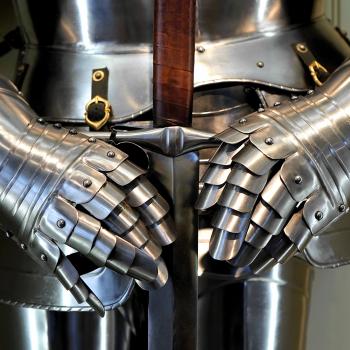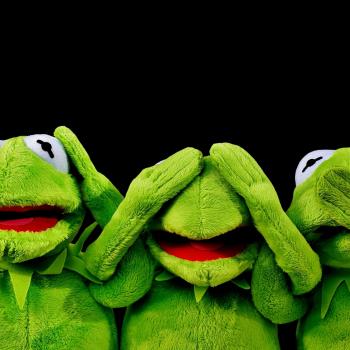To Train Up A Child, pp.
We’re still in the chapter about children’s development. In today’s section Michael introduces the idea that a morally immature child is still in the womb morally and spiritually, and that the parent must act as the child’s conscience until they reach moral understanding. But in all of this, Michael somehow misses what is perhaps the most important aspect of children’s moral development. With that introduction, let’s get started!
A SPIRITUAL FETUS
Life is designed by God to be a spiritual womb, a place where the work of creation continues. Yes, the physical creation is complete and He is rested from it; but the moral creation goes on. Men are not born wise, righteous, experienced, or developed in consciousness.
Adam and Eve were never incomplete physically or morally. The rest of us must grow through different stages to reach viability. A four-month fetus, still in the mother’s womb, is a living soul. Though all the tiny members appear viable, the baby is an incomplete creation needing further growth before becoming distinct from its mother. In like manner, a three-year-old child has all the tiny features of a morally responsible adult—a knowledge of right and wrong, a sense of justice, accountability, conscience, duty, guilt, shame, etc. Yet, none of the moral faculties are developed to the point of being fully operative. The child is not a morally viable soul. He is an uncompleted moral being. He is not accountable. Morally, the three-year-old is still in the womb. As the child grows, he slowly makes a transition from no moral understanding to complete accountability. There are vast differences of opinion as to when God deems them accountable for their own actions and thoughts. Without any basis, twelve years old has been the traditional age. Biblically, it will be sometime before twenty years of age (Deut. 1:39 with Num. 14:29-31).
One thing I do know is that it is not an “age of accountability,” but a “state of accountability” (James 4:17; Lev. 5:3). Maybe as early as five for some children. Maybe as late as fourteen for others. I don’t know.
So, background. Christians generally do not believe that the very youngest children can be held accountable for their sins, because they lack the moral understanding needed to be held fully responsible for their actions. The point where children become accountable for the wrongs they do is generally called the “age of accountability,” and where Christians locate that point has varied across denomination and time period. I was taught that the age of accountability is somewhere around the age of seven, but that it varies from child to child. Michael is placing that point roughly between the age of five and the age of fourteen, and embracing the idea that it varies from child to child.
What I find new in this passage, though, is the idea that a child under the age of accountability is a “spiritual fetus.” I’ve never heard the age of accountability compared to birth before. I’m not completely sure what to think of this comparison, but I don’t immediately see anything glaringly problematic about it. Those of us who are parents do indeed to a lot to nurture children’s growing understanding of morality in their early years. Some things are instinctive, but some things need teaching and even the things that are instinctive often need shaping. Young children are still morally “in development.”
THE DILEMMA
The dilemma parents face is: How do we relate to the child during this transition period from no moral understanding to complete accountability? When the child is 30% morally cognizant and 70% morally naive, how do we relate to him? How do we know to what degree he is responsible? We know as far as judgment is concerned, God will not deem him blameworthy until all moral faculties are completely operative—until he becomes a morally viable being. But if the parent waits until the child can understand the need to exercise self-control, by then he has developed both a history and a habit of indulging his flesh to the full. The problem the parent must address is that the natural drives function a great while before the reason. The child’s first learning experiences occur in a parent-supported, self-indulgent environment. It could not be otherwise.
The parent does not want to destroy the child’s natural drives, but we would like to instill moderation. Yet, at an early age the child is incapable of choosing moderation.
Michael and I both believe that young children’s moral development needs to guided. Here we have agreement. Where we disagree is, I think, twofold. First, I don’t see young children as the inherently evil beings Michael appears to see them as in other sections of his book. Yes, I see children as having an immature sense of morality that needs developing, but unlike Michael I don’t see them as being completely and totally selfish or indulgent. Second, Michael and I very much disagree on how morality should be taught. I tend to think that actually talking with them about moral and ethical issues, face to face and heart to heart, goes a long way. Michael would prefer “training” them to obey every parental order immediately and without question, which seems to me to offer an extremely warped sense of morality.
To be honest, I feel like there is a lot of promise in this section, but that it is ultimately squandered. The takeaway from learning that your small child is not completely developed morally should be to be more understanding of their faults and more ready to communicate with them, listen to them, and teach them. It should be a realization that you as a parent need to be helping your child learn to be a mature moral being. But instead the takeaway is, well, we’ll have to wait and see, won’t we? Let’s continue with the next section.
PARENTAL RESPONSIBILITY
Here is where we come to the crux of this whole chapter and the background for this whole book. It is important to understand: PARENTS MUST ASSUME THAT PART OF THE CHILD’S MORAL DUTY WHICH IS NOT YET FULLY DEVELOPED. The parents’ role is not that of a policeman, but more like that of the Holy Spirit. When the child has his sails full of wind (strong drives), but no compass (moral discernment), the parents must be the navigator. When they are as yet incapable of conviction, our training and example will be their “standards.” Before they can DECIDE to do good we must CONDITION them to do good. There was a time when the mother breathed for the child, ate for the child and handled his waste. Likewise, in the moral realm, until the child’s reason and moral faculties develop to the point of independent operation, the parent must be the voice of his yet unborn conscience, his initiative and his set of values.
Wait. Wait. And this is where I realize that I should have been a bit more suspicious of Michael’s age of accountability/birth metaphor. Before a woman gives birth, the fetus is 100% dependent upon her body, which, as Michael says, breathes for it, eats for it, and handles its waste. All of this changes in a moment at birth. Suddenly, the child breathes on its own, is able to eat on its own, and handles its own waste. This change is instantaneous and biological. It is not gradual, it is sudden. This, quite simply, is the problem with comparing the age of accountability to birth.
Parents don’t have to serve as a child’s moral compass until that child magically arrives at the age of accountability. Parents have to help the child develop a moral compass so that the child can arrive at the age of accountability (or whatever, to put it in secular terms, moral maturity).
Each day he gets closer to his birth into moral individuality. Someday his spiritual heart will function without you. He will leave the protection of your sanctification and stand alone in the light of his own conscience (1 Cor. 7:14). Until maturity, the only moderation the child will know is what the parents instill.
The parent must understand his role in the moral weaning of the child. One day, he or she is going to be able to choose. No amount of training is going to override the certainty of sin developing; but the training we give can make it easier for repentance to follow sinful indulgence.
What? What? You can’t point out that someday the child will have to function morally without his parents, and use the term “the moral weaning of the child,” without actually discussing how this is to take place! All Michael does here is reinforce the idea that there’s a dichotomy—first, the parents are the child’s conscience, and then, at a moment of moral “birth,” the child is suddenly and instantaneously able to be her own conscience. It doesn’t work like this!
In the infant and young child, we do not deal with their “selfishness” as sin, but we are aware of where it is headed. Drives, which are not in themselves evil, nonetheless form the occasion to all sin. Our training must take into consideration the evil that a self-willed spirit will eventually bring.
It seems to me that Michael sees a dichotomy here—to avoid your child having a self-willed spirit, you have to make their spirit complete selfless by requiring their instant and complete obedience. Is there no middle ground? Is there no way to teach children that their desires and needs matter, but that they also need to take into account others’ desires and needs?
We parents cannot impart righteousness to our children, but we can develop in them a firm commitment to righteousness. We cannot write the law on their hearts, but we can write the law and gospel on their consciences.
I think Michael is confusing conscience with outward actions here. Michael is right that we cannot dictate our children’s hearts, and I’m very glad to see him admit that. When I talk to Sally about ethics or empathy, I’m fully aware I cannot force her to adopt an ethical standard or show empathy to others. All I can do is work to foster those things, both through teaching and through example. But Michael suggests that we can dictate our children’s consciences. I don’t think that’s true. More than that, his book doesn’t teach parents to dictate their children’s consciences, it teaches parents to dictate their children’s actions.
Anticipating this development and its consequences places an urgent sense of responsibility upon us. The world is an undertow pulling our children to destruction. Looking at statistics alone, the probability is against their moral survival. The training we give and the wisdom we impart can make all the difference in the outcome. You hold an eternal soul in your hand. You cannot afford to give in to indifference, laziness, or careless neglect. It is the parents’ responsibility to determine what level of understanding a child has and to hold him accountable at that level.
This is scare tactics. Look, if you model and teach both sound ethics and empathy, the odds are that you will succeed in raising a morally mature child. But what Michael’s doing here is trying to convince parents that this venture is so precarious they must trust to his specific methods or risk losing their children’s eternal souls.
This is an almost impossible task if you depend on your intellect alone. If you are the principal caretaker of your child, your heart will be able to discern the world from his perspective. When the child believes it is wrong, it is wrong (James 4:17). Where there is moral understanding and he disobeys, he should be punished with the rod. Where there is lack of understanding of the moral quality of his actions, he should be trained and conditioned. Sometimes the rod is used in training. More will be said about this later.
To start with, I think Michael is saying you can’t help your children become morally mature by only appealing to their intellect—i.e., by only discussing things like ethics and empathy with them. I suppose that in one sense Michael is right—it is indeed very important that you as a parent also model sound ethics and empathy. But that’s not what Michael is talking about. He’s talking about training children to obey parental commands instantly and without question.
Michael says that parents are automatically able to see the world from their children’s perspective. And then he does something that makes me hurt inside. See, he’s not actually saying parents should try to see the world from their children’s perspectives (something I am, as regular readers will know, a huge fan of). Instead, what Michael’s saying is that parents are naturally able to tell whether a child knows an action is right or wrong. In other words, he’s saying that parents are automatically able to read children’s minds and know whether an action stems from actual intentional disobedience or simply curiosity or misunderstanding. That Michael could mention the idea of seeing things from a child’s perspective and then twist it into this makes me feel sick.
But I think the real point comes at the end of the paragraph. Michael advises “punishing” children who do wrong when they know it is wrong, and “training” children who do wrong when they don’t know it’s wrong—and doing both of these things “with the rod.” Do you notice what is missing? Actually teaching the child about things like ethics or empathy. Having conversations, looking in a child’s eyes and striving for mutual understanding, guiding children in developing sound ethical systems—where are these things? The “training” Michael advises for children who do not have moral understanding is actually, as we know from previous sections, not teaching at all but rather mere conditioning. You condition a child to stop doing the given action by inflicting pain on them every time they do it, until ultimately the become afraid of the offending object or action and avoid it. You don’t actually give moral instruction or converse with them. You just condition.
So where does actually teaching children about things like ethics or empathy come into play here? The clear answer is that it doesn’t. Michael tells parents to train children into absolute and instant obedience, and to condition them out of bad behaviors or actions, and then somehow to assume that moral understanding will just kick in. What he doesn’t seem to get is that his emphasis on conditioning and absolute obedience may serve to short-circuit normal moral development. How are children who have simply been conditioned to absolute obedience to parental commands to develop moral maturity?
Or does Michael mean something very different than I do when I think of moral maturity? Is he talking about simple obedience? Because that might explain a lot. Perhaps, if the goal was simply a child who obeyed prescriptions—by they from a parent or from the BIble—the best course of action would be to condition a child to absolute and complete obedience rather than talking with them about things like ethics or empathy. If the goal is not to develop an independent and ethical adult who makes her own decisions and thinks her own thoughts but rather to develop a compliant adult who does as told, Michael may well be on the right track.














